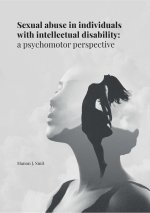
Sexual abuse in individuals with intellectual disability
Omschrijving
Rosa is a thirty-year-old woman diagnosed with a mild intellectual disability. She lives in a 1 care facility. Rosa loves to watch soccer and attends the local soccer match every Sunday afternoon. Since a few months, she shows aggressive outbursts and injures herself. Rosa’s caregivers are concerned and ask the facility’s behavioural therapist for advice. She refers Rosa to psychomotor therapy (PMT), an experiential therapy with bodily experiences and movement behaviour as its cornerstones to diminish psychological and behavioural problems.
Rosa, in her own words, came up with the following goal for PMT: “I don’t want to be angry anymore and hurt myself no longer.” The psychomotor therapist translates this statement into a specific treatment goal, namely to diminish aggressive outbursts and self-injury by improving the ability to recognize and interpret bodily signals and regulate tension. In the first PMT session, Rosa opts for a game of soccer. When the psychomotor therapist touches Rosa while trying to steal the ball, she gets very angry and loudly screams “No, Stephen, no”. Her psychomotor therapist notices Rosa’s aggressive reaction, but the alarm bells ring especially loud by Rosa shouting the unfamiliar name “Stephen”. Her psychomotor therapist stops the activity and starts a conversation about what happened. He asks Rosa why she got so angry and who Stephen is. He discovers that Rosa is being sexually abused by a supporter of the soccer club called Stephen, every Sunday afternoon; the physical contact with the male therapist caused a flashback to the abuse. After Rosa’s disclosure of sexual abuse, the psychomotor therapist wonders why the sexual abuse was not detected before the PMT referral. Since the flashback was triggered by physical contact, the therapist decides to examine Rosa’s body experience in greater depth. He starts looking in the literature for known body-related consequences of sexual abuse and assessment instruments he might use for this purpose. Also, he feels insecure and incompetent how and where to report Rosa’s disclosure. He wonders whether policy and protocols on sexual abuse are available within the care facility and where to report Rosa’s disclosure.
Rosa’s case illustrates one of the many harrowing cases of individuals with intellectual disability (ID) who have been sexually abused. Research has shown that individuals with ID are particularly at risk of sexual abuse (Mailhot Amborski et al., 2021; Tomsa et al., 2021). This serious issue is only beginning to receive attention in both research and clinical practice for about thirty years (Byrne, 2018; Taylor Gomez, 2012). For a long time, the sexuality of individuals with ID had been denied and suppressed; they were seen as individuals without sexual needs and feelings (Kempton & Kahn, 1991; Taylor Gomez, 2012). Since the disability rights movement and deinstitutionalization of individuals with ID, these attitudes towards sexuality in individuals with ID have changed, resulting in growing awareness of the prevalence and impact of sexual abuse in this group (Byrne, 2018; Curtiss & Kammes, 2020; Taylor Gomez, 2012). To my knowledge, this thesis is one of the first that focuses on sexual abuse in individuals with ID.
